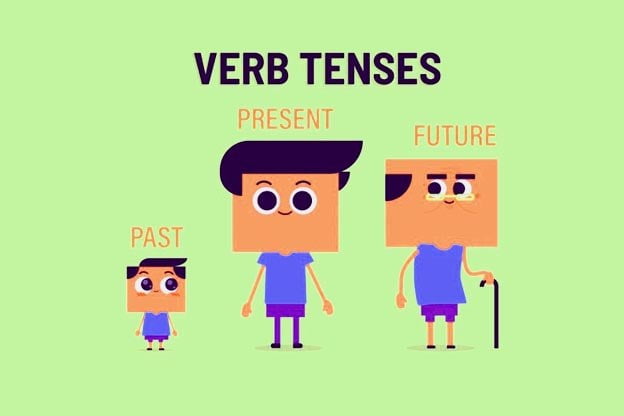In modern linguistic theory, tense is understood as a category that grammaticalizes time reference; namely, one which, places a state or action in time. Tenses are usually manifested by the use of specific forms of verbs, particularly in their conjugation patterns. The main tenses found in many languages include the past, present, and future. Some languages have only two distinct tenses, such as past and nonpast, or future and nonfuture. There are also tenseless languages, like most of the Chinese languages. Thus, tenses generally express time relative to the moment of speaking.
Many grammarians take the view that there are only two tenses in English: present tense and past tense. That is because we make those two tenses with the verb alone – he walks, he walked. They do not consider that he will walk, he is walking or he has walked (for example) as tenses because they are not formed solely from the verb “walk”.Thus, English has only two morphological tenses: the present (or non-past), as in he goes, and the past (or preterite), as in he went. The non-past usually references the present, but sometimes references the future (as in the bus leaves tomorrow). In special uses such as the historical present, it can talk about the past as well. These morphological tenses are marked either with a suffix (walk(s) ~ walked) or with ablaut (sing(s) ~ sang). In some contexts, particularly in English language teaching, various tense-aspect combinations are referred to loosely as tenses. Similarly, the term “future tense” is sometimes loosely applied to cases where modals such as will are used to talk about future points in time. For English learners, most EFL teachers and books treat all these constructions as tenses.
Verb Tenses
In the English language, verb tenses express when an event occurs. Verb tenses are also used to convey events from the past, present, or future. They give the audience a better understanding of when something happened. These verb tenses typically follow auxiliary words. An auxiliary word is a helping word, often a verb, that enhances the underlying meaning of a clause’s main verb. Auxiliaries provide information about a verb’s tense. They can also express details about a mood, number, or person. Can, may, must, and will are examples of auxiliary words.

Verb tenses are used to show when something has or will happen. Before choosing a tense, consider these tips:
- Know the correct way to express your verb in different tenses, such as adding -ed to a word.
- Avoid shifting tenses and remain consistent with verb tense usage.
- Pick the correct auxiliary words, such as will or have.
Most verb tenses follow a specific formula based on the tense you choose. Note the verb form in parentheses in these formulas:
- V1 is the base form of the verb (clean, shop, begin)
- V2 is the past simple form of the verb (cleaned, shopped, began)
- V3 is the past participle form of the verb (cleaned, shopped, begun)
| Verb Tense | Formula | Example |
|---|---|---|
| Present Simple | Subject + Verb (v1) + s/es | I play music nearly every day. |
| Past Simple | Subject + Verb (v2) or irregular verb | Yesterday, I played an entire album. |
| Future Simple | Subject + will/shall + verb (v1) | I will play as many albums as I can this month. |
| Present Continuous | Subject + is/am/are + Verb(+ing) | I am playing The Offspring right now. |
| Past Continuous | Subject + was/were + Verb(+ing) | I was playing Marshmello and Halsey last night. |
| Future Continuous | Subject + will be/shall be + verb(+ing) | I will be playing My Chemical Romance after I download my favorite album. |
| Present Perfect | Subject + Has/have + Verb (v3) | I have played so many songs I can’t keep track. |
| Past Perfect | Subject + had + Verb (v3) | I had played at least 100 albums by the time I was 10. |
| Future Perfect | Subject + will have + verb(v3) | I will have played at least 1,000 songs by the time this year ends. |
| Present Perfect Continuous | Subject + Has/have + been + Verb(+ing) | I have been playing music since I was a toddler. |
| Past Perfect Continuous | Subject + had + been + Verb(+ing) | I had been playing for at least a year before my parents bought me my own iPod. |
| Future Perfect Continuous | Subject + will have been + verb(+ing) | I will have been playing songs for at least 3 hours before practice tonight. |
(Note: v1 = base form of the verb; v2 = past simple form of the verb; v3 = past participle form of the verb)
The tense of a verb is determined by when the action took place. The tense of a verb can also tell us things like whether the action is habitual, ongoing, or completed. This is called the aspect of the verb, which is part of the tense. However one cannot talk of tenses without considering the two components of English tenses: time and aspect.
Time expresses:
- past – before now (E.g., I walked.)
- present – now, or any time that includes now (E.g., I walk.)
- future – after now (E.g., I will walk.)
- past – before now (E.g., I walked.)
Aspect can be:
- progressive – uncompleted action
- perfective – completed action or state
The progressive aspect produces progressive or “continuous” tenses: past continuous, present continuous, future continuous. The perfective aspect produces perfect tenses: past perfect, present perfect, future perfect. And the two aspects can be combined to produce perfect continuous tenses: past perfect continuous, present perfect continuous, future perfect continuous.
Examples of Verbs in Different Tenses
Here are some examples of verbs in different tenses:
- I walked to work.
(The verb walked is in the past tense.) - I walk to work.
(The verb walk is in the present tense.) - I will walk to work.
(The verb will walk is in the future tense.)
- I walked to work.
Verbs do not just express actions. They can also express a state of being. For example:
- I was happy.
(The verb was is in the past tense.) - I am happy.
(The verb am is in the present tense.) - I will be happy.
(The verb will be is in the future tense.)
- I was happy.
Here are some more examples of verbs in the past, present, and future tenses:
- The hardest that I have laughed at a movie was probably Team America. I laughed ’til I thought I was going to throw up. (Ron White)
(The italicized verbs are in the past tense.) - You laugh at me because I’m different. I laugh at you because you are all the same. (Jonathan Davis)
(The italicized verbs are in the present tense.) - Nobody will laugh long who deals much with opium; even its pleasures are of a grave and solemn complexion. (Thomas de Quincey)
(The italicized verbs are in the future tense.)
- The hardest that I have laughed at a movie was probably Team America. I laughed ’til I thought I was going to throw up. (Ron White)
These different versions of the tenses are needed because they help us to state whether the action (or state of being) is in progress or completed. For example, the different versions of the verb to laugh are as follows:
Past Tense: laughed, was/were laughing, had laughed, had been laughing
Present Tense: laugh, am/is/are laughing, has/have laughed, has/have been laughing
Future Tense: will laugh, will be laughing, will have laughed, will have been laughing


























